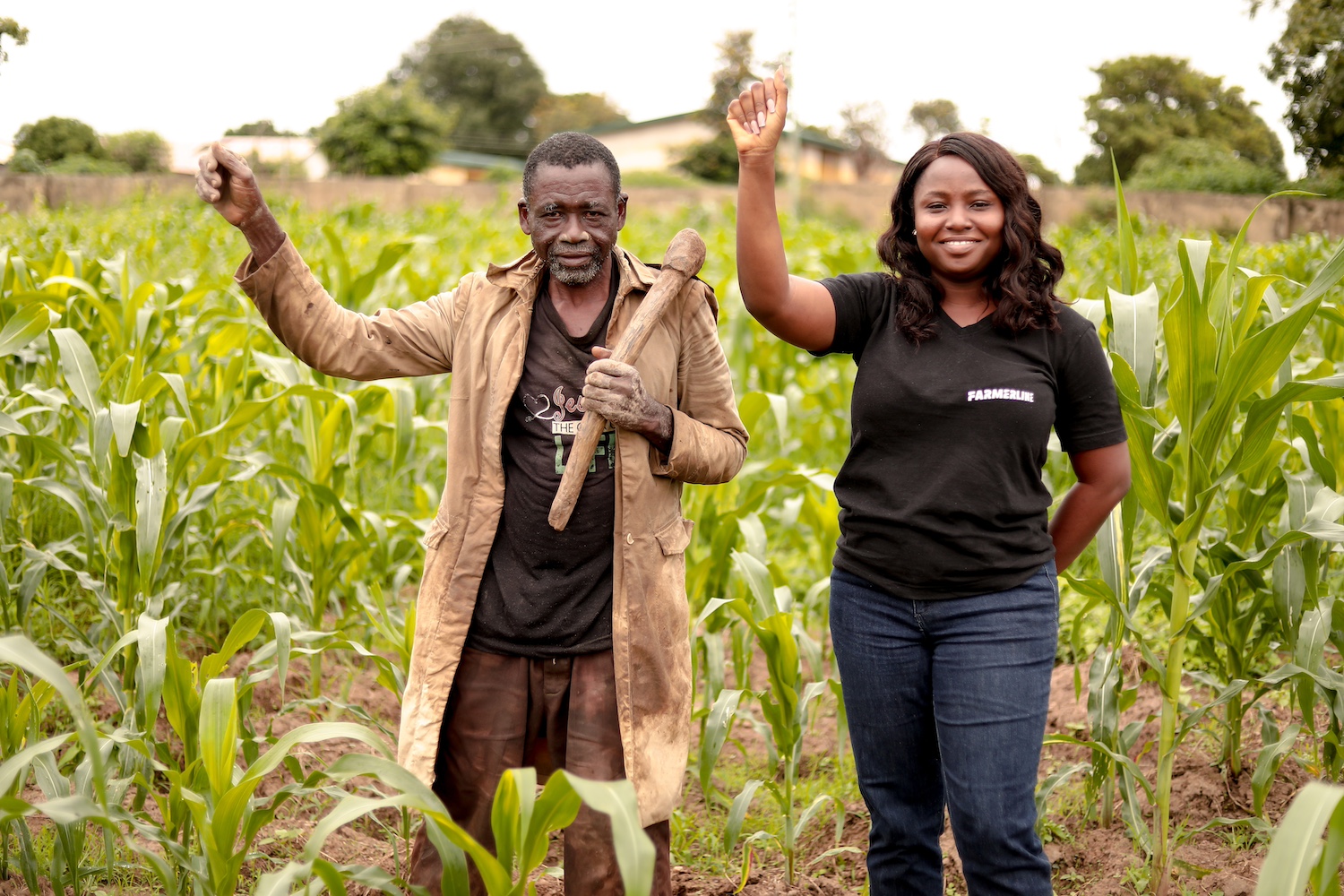
Farmerline helps smallholder farmers access crucial resources and information. Though much of this support is digital, it works around a lack of internet infrastructure in rural areas by making information available offline. (Image courtesy of Farmerline.)
Approximately 33 million smallholder farms in Africa produce the vast majority of food for the continent, but yields often fall below their potential due to a lack of available finance, resources, information and market access, according to the sustainable farming charity Farm Africa. Farmerline, an agriculture technology company based in Ghana, helps farmers overcome these barriers and build wealth.
In 2013, Farmerline started providing 800 smallholder farmers in Ghana with important agricultural information they could listen to instead of reading. It wasn’t long before the company saw a much greater need. “You realize that farmers need more than just information, they need support,” Princess Anita Asabere, the head of commercial and partnerships at Farmerline, told TriplePundit.
Offering support where farmers need it most
So the organization took a new approach, helping farmers access resources, credit, and the agricultural market as well as providing vital information in local languages. For example, smallholder farmers often lack access to financial services, so they might not be able to purchase enough supplies for their farmland to reach its full production potential, Asabere said.
“If a farmer is supposed to apply five bags of fertilizer to a certain acre of maize, he may not be able to afford the five bags instantly,” she said. “In this case, they tend to reduce the number … affecting their yields.”
To rectify this, Farmerline buys high-quality seeds and fertilizer in bulk and provides them to farmers at affordable prices. The farmers then have the option to pay for the products over the course of the growing season. Since they don’t have to pay the loans back until after harvest, farmers are not tempted to cut back on the supplies they need and can maximize the amount of crops grown on their land. Solving theses interconnected issues helps increase yields and build wealth.
Connecting farmers to wider markets is integral to this effort. Farmerline partners with organizations, businesses, and governments on a global level, creating a network of commodity buyers, Asabere said. Though they are not required to do so, farmers can sell their produce to Farmerline directly, guaranteeing a buyer at fair market prices. Then, Farmerline exports the produce to international buyers.

The technology that brings it all together
In addition to these supports, which are available in eight African countries, Farmerline expanded its audio agricultural information services to 50 countries by partnering with thousands of local businesses, governments, and industry leaders. Informational messages on a range of agricultural and sustainability topics are broadcast in 27 different languages through the organization’s Mergdata platform, Asabere said.
“It’s climate-smart advisory, where farmers receive real-time weather alerts on their phone, knowing the right time to grow their food and also the right time to harvest,” she said. “Economic advice, financial literacy, promoting regenerative or sustainable farming practices like climate resilient crops, and also soil conservation techniques.”
Farmerline also uses its Mergdata platform as part of an alternative credit scoring system when loaning farmers resources like seeds and fertilizer. Whereas traditional banks won’t offer credit to smallholder farms, the platform evaluates farmers for financing based on their history, potential and current market trends, Asabere said.
Mergdata also tracks commodities and ensures transparency, she said. This optimizes the supply chain and helps farmers comply with export regulations, such as the European Union (EU) Deforestation Regulation.
“The EU government is saying that specific commodities — cocoa, or coffee, and a few others — that you are bringing into the EU market can’t come from deforested land," Asabere said. "There definitely has to be a technology platform that will trace your cocoa from the farm … all the way to the consumer."
Overcoming limitations and increasing reach
Language barriers and connectivity are the primary limitations Farmerline faces in its work, Asabere said. By using a voice-based system instead of text-based and expanding into multiple languages, the company can reach farmers around the world regardless of their literacy levels. And making the messages available offline allows Farmerline to work around the lack of internet infrastructure in rural areas.
Farmerline also faces distrust from farmers, which can make them reluctant to adopt the system. “Many smallholder farmers had been historically underserved, making them skeptical about new solutions,” Asabere said. “We had to invest heavily in on-ground engagement to build trust.” Support and engagement are ongoing, with multiple teams working in the field, she added.
Still, its work is making a difference, as farmer testimonials demonstrate. One example is a maize farmer in Ghana whose yields were low because she only had access to low-quality seeds and fertilizer — a common experience for smallholders in the country, Asabere said. “After receiving the support from Farmerline, and also the advisory support that she needs to grow the food well, she was able to increase her maize yield by 40 percent in just one season,” she said.
So far, Farmerline has supported 2.2 million farmers in 50 countries, Asabere said. And a million farmers actively use Mergdata for information on how to achieve higher yields.

Riya Anne Polcastro is an author, photographer and adventurer based out of Baja California Sur, México. She enjoys writing just about anything, from gritty fiction to business and environmental issues. She is especially interested in how sustainability can be harnessed to encourage economic and environmental equity between the Global South and North. One day she hopes to travel the world with nothing but a backpack and her trusty laptop.













